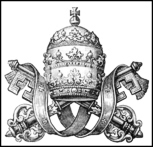CLICK: TCW's Latest on Damning Doctrine of Antipope "Bob from Chicago"
True Catholic News
In Today's Catholic World News Blog
The Vatican Council in 1870 infallibly stated that St. Peter HAS (not will have) perpetual successors.
The pertinent quotation is found in Denzinger #1825: Si quis ergo dixerit, non esse ex ipsius Christi domini institutione seu iure divino, ut beatus Petrus in primatu super universam ecclesiam habeat perpetuos successores; … anathema sit.”
Habeat = he has (present tense—subjunctive because it follows dixerit according to sequence of tenses). Future tense (he will have) = habebit. He must have = debeat habere. Habeat then equals has, not must have or will have.
Perpetuus, a, um:
• Cassell’s Latin-English and English-Latin Dictionary: (peto) continuous, uninterrupted, continual. I. a, of space, munitiones, Caes.; oratio, Cic; carmen, Hor.; b. of time, unbroken, continuing, lasting, perpetual; ignis Vestae perpetuus ac sempiternus, Cic; questiones, composed of a standing body of judges, Cic; interpetuum, for ever, Cic. II. universal, general; jus, Cic. (Also see) • Second Latin, Scanlon and Scanlon: perpetual, everlasting, unfailing; in perpetuum, forever.
"It is necessary for salvation that all the faithful of Christ be subject to the Roman Pontiff."
(V Lateran Council)
May. 17, 2013



